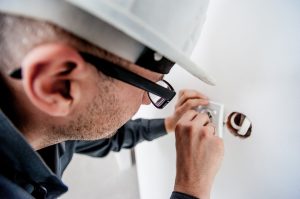10 businesses that can benefit from an Inland Marine Insurance Policy
Landscaping
Lawn care and Landscaping companies use trailers to transport the machines they use to do their work. A commercial auto insurance policy will cover your vehicle, but not the trailer and any equipment being transported. An Inland Marine Policy will cover the specialized equipment landscaping companies transport to the facilities they work.
Real Estate Agencies
Much of the work that real estate agents do is over the phone, via email or at a remote location. If the business provides the agents with their own mobile device or laptops than those devices are at risk without an inland marine insurance policy. There may be other types of equipment agents use for promotional purposes that are covered under the policy as well.
Construction Companies
Construction companies are very diverse in the scope and extent to which they work. Some companies are a handyman with one or two employees who may have a minimal amount of tools. Other construction companies may have as many as 20 employees who each have their own set of tools, backhoes, tractors, paving equipment and generators just to name a few. No matter how many tools a construction business does have, without an inland marine insurance policy those tools are at risk.
IT Professionals
Information Technology Professionals tend to work with and on technology products. Primarily, personal computers and other types of computer products. Frequently, these companies are having to make house calls, either to customers’ residence or their business, where they are working with the tools these people use to do their work and live their lives. Many of these customers have a very basic knowledge of how computers and their networks actually work. Helping these people fix their products without putting yourself or your business at risk is a slippery slope. Securing an inland marine insurance policy is a must for this type of business.
Electricians
Electricians, like many businesses, do a majority of their work at a remote site. Many random pieces of equipment are needed for electricians to do their jobs. And Inland Marine Insurance Policy can help Electricians protect themselves and their business from damage, theft or vandalism.
Musicians/Travelling Entertainers
Entertainers spend the majority of their time out on the road. With the onset of digital technology, record sales have plummeted over the past decade. For this reason, entertainers must make their living through the live performance. Musicians have an extremely large amount of equipment they carry with them everywhere they go. Failing to secure an inland marine policy can be the difference between replacing your gear after one missed gig or cancelling an entire tour because you do not have the cash flow to cover damaged or stolen equipment.
Engineers and Architects
Engineers and Architects tend to do a decent amount of their work out on location. There is usually a significant amount of equipment they carry with them to the job site and the equipment tends to be expensive. Unless they have an inland marine insurance policy the risk for losing this equipment falls on the business. Partnering with a trusted independent insurance agent can be beneficial for these businesses to determine just how much equipment they have, what the value of that equipment is and if they are willing to take the risk of that equipment being damaged or stolen.
Commercial and Residential Cleaning Companies
Cleaning companies have a lot of equipment they use on a daily basis. Some of the equipment can be extremely expensive. The risk for inland marine coverage is greatest for residential companies. This is because residential cleaning companies typically travel to two or more locations throughout the day. While the employees are driving from location to location the business is at risk. The business is also at risk while the employees are at the remote location doing the actual cleaning. Commercial cleaning companies on the other hand commonly travel to one site and clean one or a few facilities at the one location. The equipment is stored at the location and not transported to and fore.
Appraisers
Appraisers; like architects, electricians and engineers, travel to off-site locations frequently. While travelling to the location and while out performing work the equipment they use to do their job is at risk of being damaged or stolen. Depending upon the scope or your appraisal business this can be a significant risk. Consulting with a trusted insurance agent can help you determine how much risk your business faces and how much if any coverage you need.
Home Health Care Agencies
Home health care agencies perform all of their work at the location of their customer. This industry can be very high risk. It tends to have a larger than normal amount of claims and their severity can be severe. These risks typically are bodily injury from the employees lifting and transporting the sick or elderly patients. The equipment they use to do these jobs can be expensive and if not covered by an inland marine insurance policy the business is at risk for any damage to the equipment.

